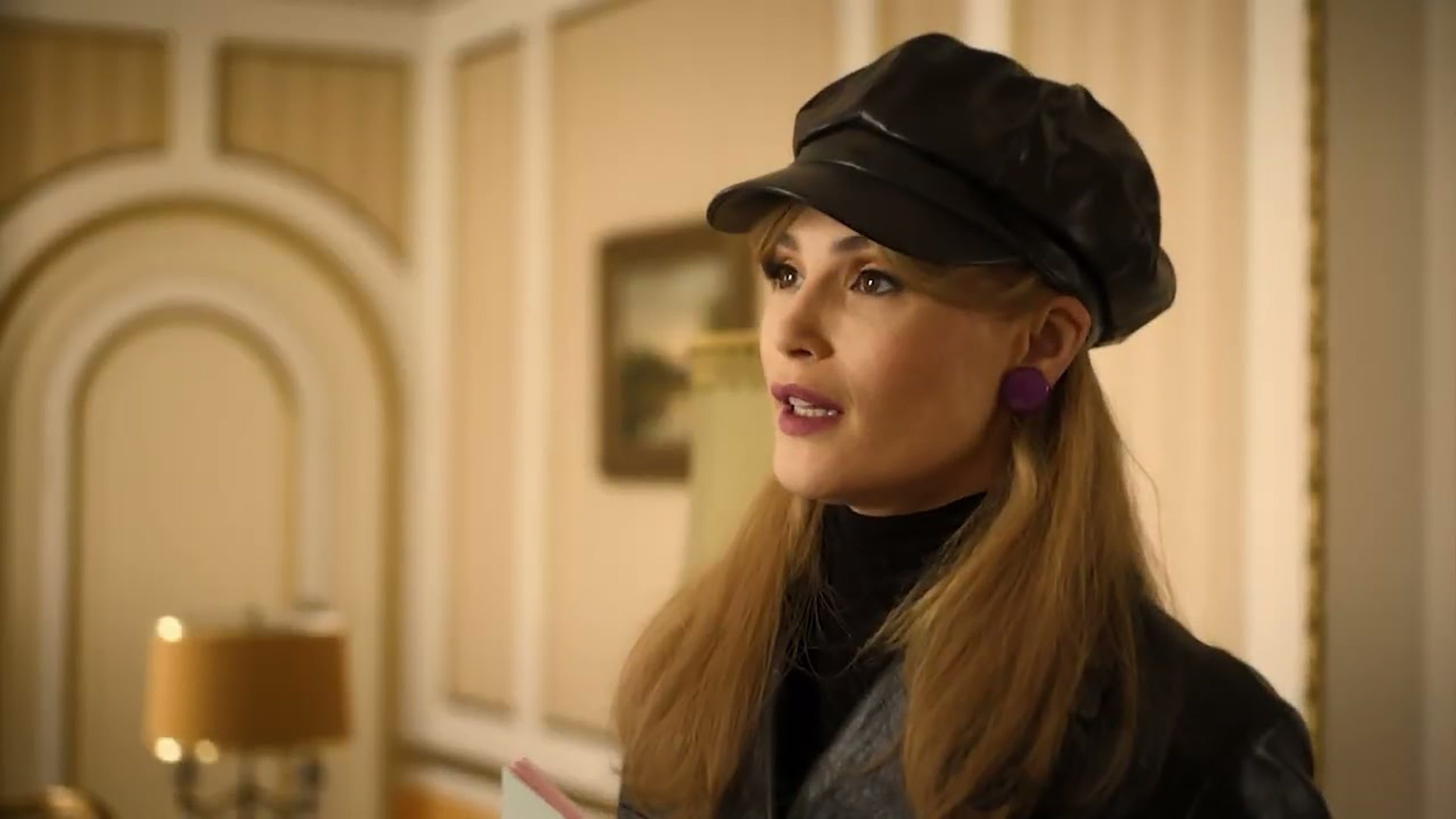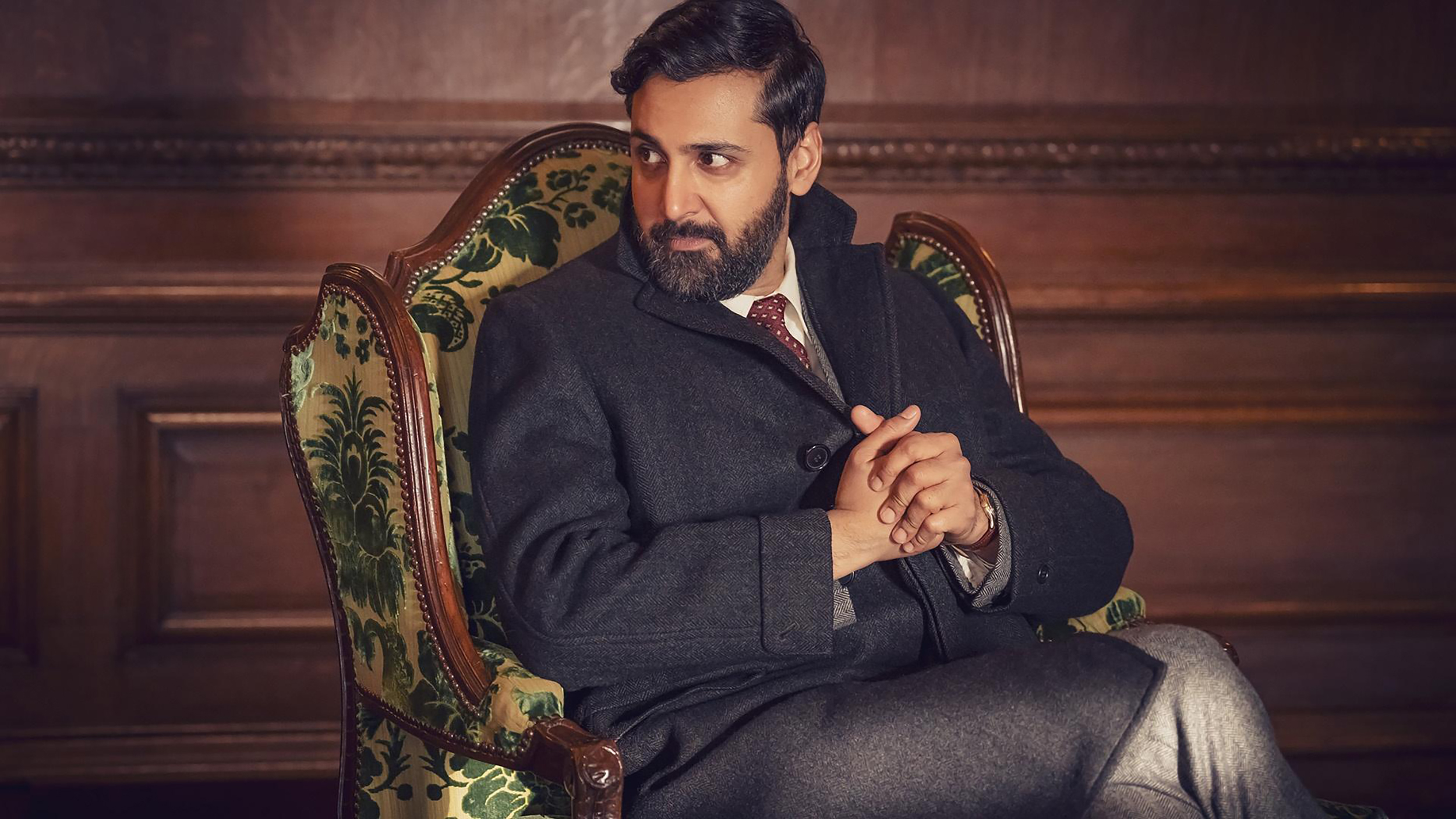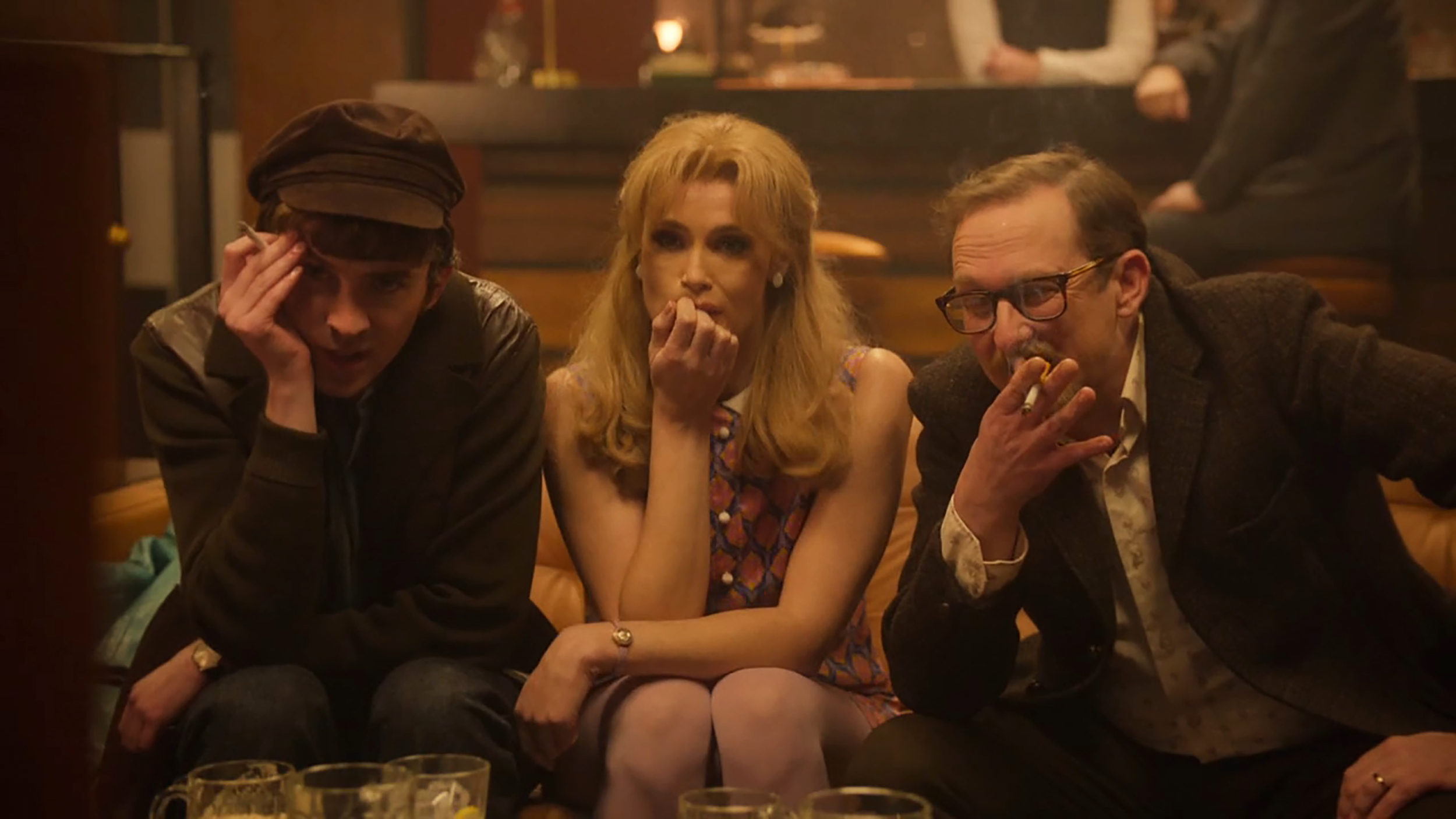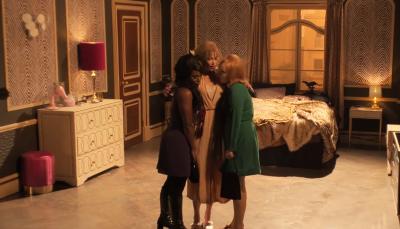Sophie Straw Seizes a Starring Role Overseas as 'Funny Woman' Reaches its Midpoint

Gemma Arterton as Sophie Straw in 'Funny Woman' Season 2
© Potboiler Productions; © Sky UK Limited
Have you seen Almost Famous? It’s Cameron Crowe’s semi-autobiographical film about the experiences of "William," a teenage music journalist writing for Rolling Stone in the early 1970s. At one point, William has gotten himself in a terrible bind: he’s been on the road with the band he’s covering, and his deadline is looming, but he still doesn’t have the piece’s crucial interview because its subject keeps putting him off. His editor corners him on the phone, demanding an update, which a hungover William (speaking in a very deep voice to maintain the ruse that he’s in his 20s) delivers flawlessly: “It’s a thinkpiece about a mid-level band struggling with their own limitations in the harsh face of stardom.”
William’s editor swallows it whole, and who wouldn’t? It’s got everything: nuance, enthusiasm, and the promise of gimlet-eyed analysis, capturing a pivotal moment in the life of a rock band that could either become huge or implode, becoming nothing more than a footnote in music history.
As Funny Woman’s second season kicks into higher and higher gears, that’s exactly Sophie Straw’s predicament. As Dennis puts it in his appearance on Pipe Smoke, Sophie is, counter to what the snobby, entitled, overeducated white guys who seem to run everything assume when they see and hear her, “an intelligent, instinctive, hugely charismatic comedic performer of great technical ability.” He’s absolutely right; those qualities have gotten her far already, but they’re not enough. Just as Bill, Tony, and Dennis were miserable working with Dilys and Ronald on the other side, Sophie is bereft without the lads. Chemistry, healthy teamwork, and experience all matter, too, and it’s the experience that Sophie needs more of if she wants to go beyond the promising start of Jim and Barbara.
To Sophie’s credit, she knows she needs more guidance from someone she can trust, and she seeks it out, consulting Marc Allen in his hotel suite before he heads over to Buckingham Palace to witness one of his clients receiving his knighthood. Marc continues to impress me. He’s inclined to be encouraging and points out that a vast proportion of her future success will rest on her ability to seize opportunities when they come her way. Eventually, his advice about being shrewd with her time and energy is bolstered by the inaccurately drawn conclusion that Edith and Dennis are reconciling, resulting in Sophie deciding to hive off to France to take a role in a very groovy-looking Nouvelle Vague film in black-and-white. Funnily enough, the part is as a cat burglar, which was one of the failed ideas from the bad-fit writing duo Ted forced on her in the season premiere.
By no means does Sophie knock it out of the park at every at-bat (or, I guess, more appropriately for the cricket fans; she doesn’t score a century every time she’s batting). She’s impulsive and presumptuous – that meeting with Marc was entirely impromptu and unannounced! Make an appointment, sheesh! She’s doing a very poor job of communicating with her father, whose uncharacteristic, frosty-yet-embarrassed silence continues to be mysterious and vexing. Asking a direct question is always an option, Sophie! Of course, that’s probably the outcome George dreads most, having decided 20 years ago to keep something significant from his daughter (as Marie calls it, “all this cloak-and-dagger business”).
And although Marj has a far more biting edge to her this season, Sophie isn’t doing nearly enough to clear the air with her. Both of them are too stubborn to stop talking past each other, and in the end, Sophie packs up some of her belongings in a huff of hurt feelings and moves into Pandora’s flat.
Despite being almost dizzy with happiness at having gotten the band back together, Dennis, Bill, and Tony are just as much out of sorts as Sophie. Bill is back to needling Tony something awful and taking truly wild risks, such as enjoying a bit of clandestine fellatio from a handsome Savile Row shop assistant when he and Tony are participating in a lads’ version of Say Yes To The Dress with Dennis. Meanwhile, Tony is in a terrible funk about his ability to write and provide for June and their baby, and Dennis is as lovesick as ever over Sophie. He allows Edith’s boss and paramour, Vernon Wigfield, to dragoon him into being a panelist on the next episode of Pipe Smoke to defend the honor of contemporary comedy.
(Side note: Your eyes do not deceive you: Pipe Smoke is the actual title of Vernon’s show. Relatedly, I may not be available to recap next week’s episode, having sustained a severe ophthalmic injury by rolling my eyes just a bit too hard at this pompous nitwit. Vernon isn’t just a nitwit, either! He also brings a self-centered entitlement to the table, indignantly telling Edith that Dennis had better grant her that divorce ASAP because he won’t sit around waiting for too long. What a cool guy! What an upgrade from Dennis!)
Tony and June are a delightful antidote to Edith and Vernon. They’re earnest and honest with each other, and there’s plenty of space in their relationship to talk about big, complicated things like sexuality, desire, and what becoming parents will mean for them as individuals and as a couple. When he acknowledges that he’s having a hard time grappling with the contradictions of adoring June while still experiencing attraction to other men,
June’s response is healthy and matter-of-fact. She thinks about other men sometimes, too, and it’s not a big deal unless they decide it needs to be. Tony, still in disbelief in having lucked out with June, wonders aloud, “Are we just a couple of freaks?” (I think “kooks” is a less pejorative term, and David Bowie, through his 1972 song “Kooks”, which is about being a sexually ambiguous dad who is “hung up on romancing” with his wife.)
Rounding out the social issues for this episode is the ongoing fight for wage equity and better working conditions at Lewis Peters. The ultra-prim Miss Sykes (Sophie’s boss in the hats department) has been radicalized by seeing how much money men make. Even the guys she started with in the mailroom years ago are earning enough money to buy houses and take their families on holiday; she lives in cramped squalor and can just about manage to pay for a single weekend away each year in Margate with her mother. She delivers a rousing speech to her fellow unionizers and leads them in a walkout, singing “We Shall Overcome”. It’s wise for the writers to remind us advocating for improved legal rights was happening worldwide at the time; using a song American viewers understand primarily as an anthem of the Black Civil Rights movement of the 1950s and 1960s is an elegant way to do it.
Another interesting and realistically messy aspect of Sophie’s character that emerges here is her reluctance to participate in the activism that galvanized Marj and Diane. Sophie isn’t lacking class consciousness, by any means, but having attained a certain level of success, she’s pretty keen to protect it. On top of everything going on with her career and relationship with Dennis – they still obviously have it bad for each other and are miserable about it – Sophie is also trying to figure out how to have a relationship with her long-absent mother. Diane kindly locates Doria, who is working as an instructor and tea-cart lady at a ballroom dance school in the Lancashire seaside town of Morecambe, and Sophie takes the train up to visit, not really knowing what she’ll find.
The two big takeaways in this scene are quite illuminating. In their one interaction last season, Doria insisted that she’d written scores of letters to her daughter, which was news to Sophie. When Sophie asks about what was in the letters, Doria can scarcely recall them all, but the one detail she shares knocked me sideways. Something about the hopeful fragility of a butterfly landing on her hand, and her asking the butterfly to fly to Blackpool to give her butterfly-loving daughter a kiss from her is so poignant. Doria attempting, for years, to maintain a relationship with her daughter is all the more heartbreaking, knowing George actively foiled those attempts. It’s uncharacteristically cruel for such a loving and sweet person, and it’s hard for Sophie to square this new knowledge with the man who raised her.
Bits & Bobs:
- This week’s big costuming note is the near-identical styling of the fictional archbishop on Pipe Smoke and the actual Archbishop of Southwark who appears on a 1979 episode of Friday Night…Saturday Morning to discuss Monty Python’s Life of Brian. Well, I say “discuss,” but what I really mean is that he thinks he’s there to smugly lecture John Cleese and Michael Palin as if forty-year-old men are schoolboys to be chastised, but after they let him pay out as much rhetorical rope as he wants, they then proceed to strangle him with it. It is delicious and worth an hour of your time. Anyway! The fictional and real archbishops are both wearing standard crimson cassocks, but their chains-and-crosses, their rings, and even their glasses, are near-exact matches. I most sincerely hope that it’s a purposeful costuming choice, and I love it.
- We’re not getting quite enough screen time with Diane this season. I get that she’s in a bit of an in-between place with her career, and it’s great that she’s seizing the means of production and getting behind the camera to try her hand at documentary reportage, but she seems to be relegated to the background a bit too much.
- Needle drop of the week goes to “Laisse-tomber les filles”, a Serge Gainsbourg song performed by France Gall. (April March recorded an English translation, retitled “Chick Habit.”) I love a cute and bouncy song addressed to a man who’d better shape up or face the consequences.
Funny Woman Season 2 continues on most PBS stations, the PBS app, and the PBS Masterpiece Prime Video Channel at 10 p.m. ET on Sundays through the end of February, taking over from Vienna Blood Season 4. All four episodes are available for members to watch as a binge on PBS Passport. As always, check your local listings and streamers.








